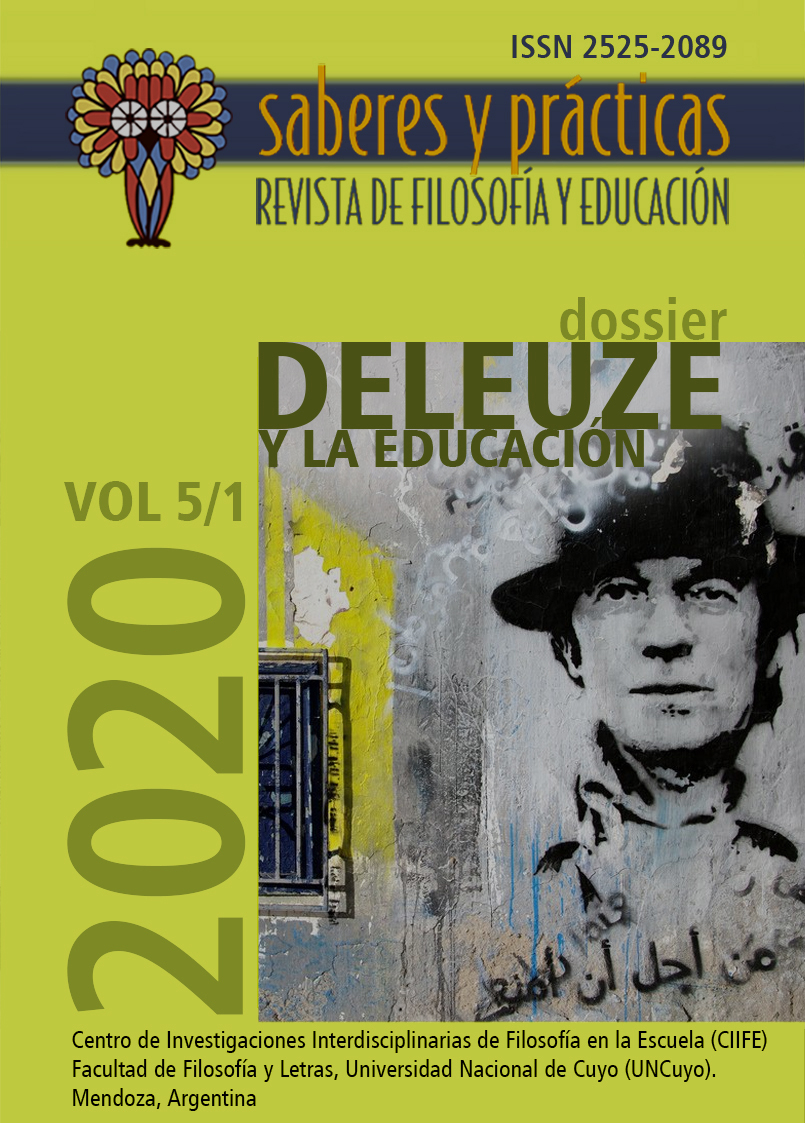Ontología deleuziana: sujeto colectivo, Estado y escuela
Palavras-chave:
Ontología, Deleuze, Sujeto, EscuelaResumo
Entendemos que toda concepción ontológica sobre el sujeto tiene implicancias en el modo en que comprendemos lo político y, por ende, en la manera en que concebimos lo escolar. Partimos del supuesto de que la escuela ha dejado de ser una institución disciplinaria, debido a la pérdida de legitimidad del Sujeto/Estado-Nación que alguna vez la sostuvo; razón por la cual, el problema que la escuela nos demanda hoy es cómo pensar, desde una ontología afirmativa, un concepto de sujeto desde el cual concebir lo escolar como espacio de creación irreductible a las lógicas del mercado. En este sentido, creemos pertinente reconstruir ciertos aspectos de la ontología deleuziana a fin de evidenciar elementos conceptuales que funcionen como fundamento de un sujeto político y un Estado pluralista en el que pueda inscribirse la escuela y las prácticas escolares, en tanto partes de un todo que la excede. Sólo así, formando parte un tropos compartido, la escuela será agente activo, capaz de resistir los embates del mercado capitalista.
Downloads
Referências
Badiou, A. (2002). Deleuze, el clamor del ser. Manantial.
Badiou, A. (2010). ¿Existe algo así como una política deleuziana? En Yves Charles Zarka y otros (2010). Deleuze político. Nueve cartas inéditas de Gilles Deleuze. Ediciones Nueva Visión.
Culp, A. (2016). Dark Deleuze. Minnesota Press.
Colson, D. (2019). A Little Philosophical Lexicon of Anarchism from Proudhon to Deleuze. Minor Compositions.
Deleuze, G. (2009). Diferencia y Repetición. Amorrortu.
Deleuze, G. (2006). Mil Mesetas. Pre-Textos.
Duschatzky, S. (2001). Todo lo sólido se desvanece el en aire en ¿Dónde está la escuela? Duschatzky, S. y Birgin, A. (comp.), pág. 127-142. Editorial Manantial.
Foucault, M. (2006). Defender la sociedad. Curso en el Collage de France (1975-1976), FCE.
Ferreyra, J. (2020). El estado intensivo: Ontología y Política en Gilles Deleuze. Revista de Filosofia: Aurora. v. 32, n. 56, p. 503-523, maio/ago. http://dx.doi.org/10.7213/1980-5934.32.056.AO02
Ferreyra, J. (2016) Una apología del Estado como aparato de captura en Deleuze y Guattari, Revista Nombres, Nº 30, 2016, p. 239-262.
Hardt, M. y Negri, A. (2012). Imperio. Paidós.
Lejarraga, A. y Nicora, C. (2011) Repensando la gestión educativa. Conversación entre dos experiencias educativas y una hipótesis. IX Jornadas de Sociología. Facultad de Ciencias Sociales, Universidad de Buenos Aires, Buenos Aires. https://www.aacademica.org/000-034/350
Lewkowicz, I. (2006), Pensar sin Estado. La subjetividad en la era de la fluidez. Paidós.
Mengue, Ph (2008). Deleuze o el sistema de lo múltiple. Las cuarenta.
Mengue, Ph. (2003) Deleuze et la question de la démocratie. L’Harmattan.
Rinesi, E. (2016) Filosofía y Política de la Universidad. Ediciones UNGS,
Pál Pelbart, P. (2016) Capitalismo rizomático. En: Vida capital, Ensaios de biopolítica. Iluminuras.
Pál Pelbart, P. (2016) Capitalismo rizomático. En: Vida capital, Ensaios de biopolítica. Iluminuras.
Rancière, J. (2002) El maestro ignorante. Laertes.
Sztulwark, D. (2010). Sobre una experiencia educativa de gestión situacional; Diploma Superior en gestión educativa. FLACSO Argentina.
Kaminsky, G. (1993) Dispositivos Institucionales: democracia y autoritarismo en los problemas institucionales. Lugar Editorial.
Zizek, S. (2010). Órganos sin Cuerpos. Pre-Textos.
Publicado
Como Citar
Edição
Seção
Licença

Este obra está licenciado com uma Licença Creative Commons Atribuição-NãoComercial-CompartilhaIgual 2.5 Argentina.


































